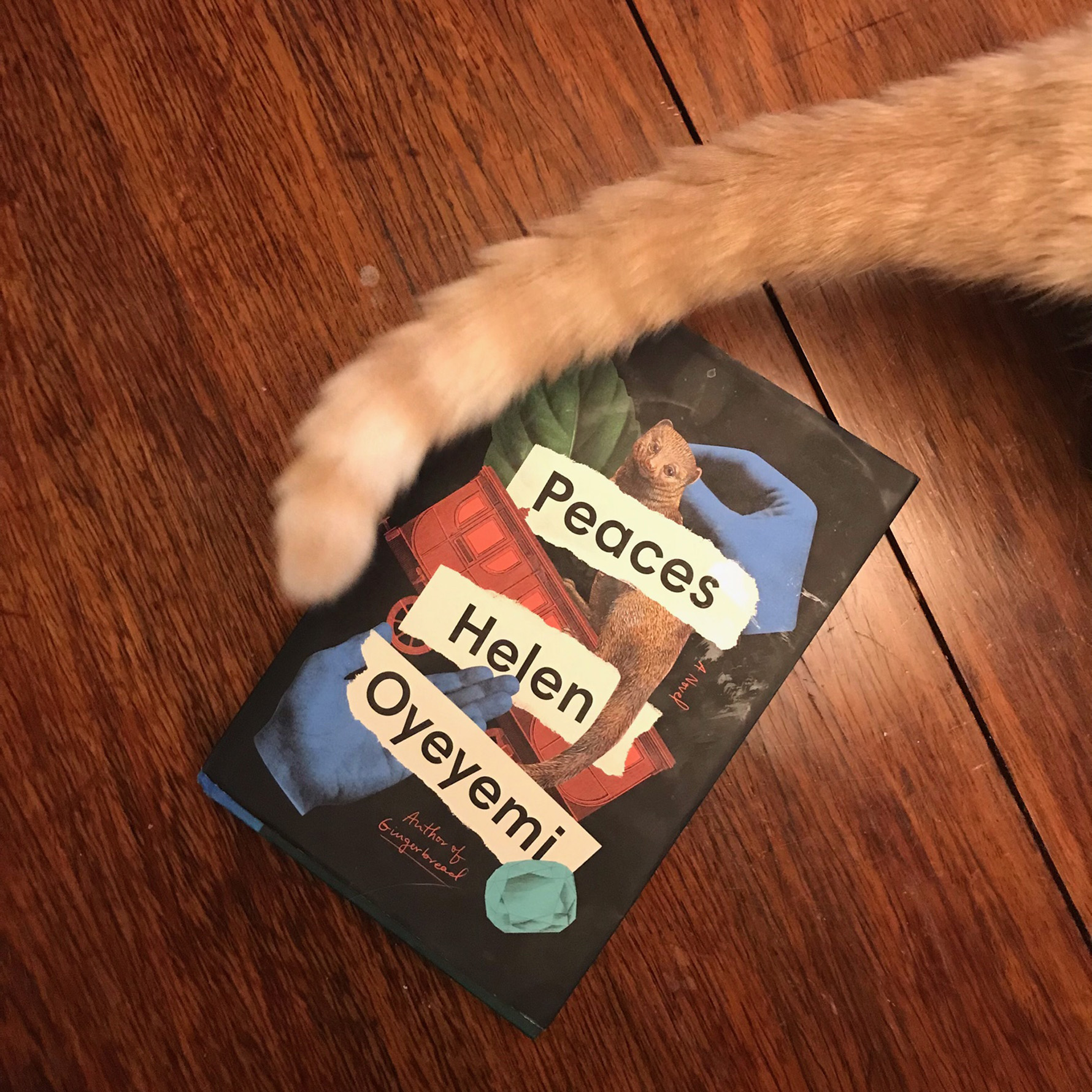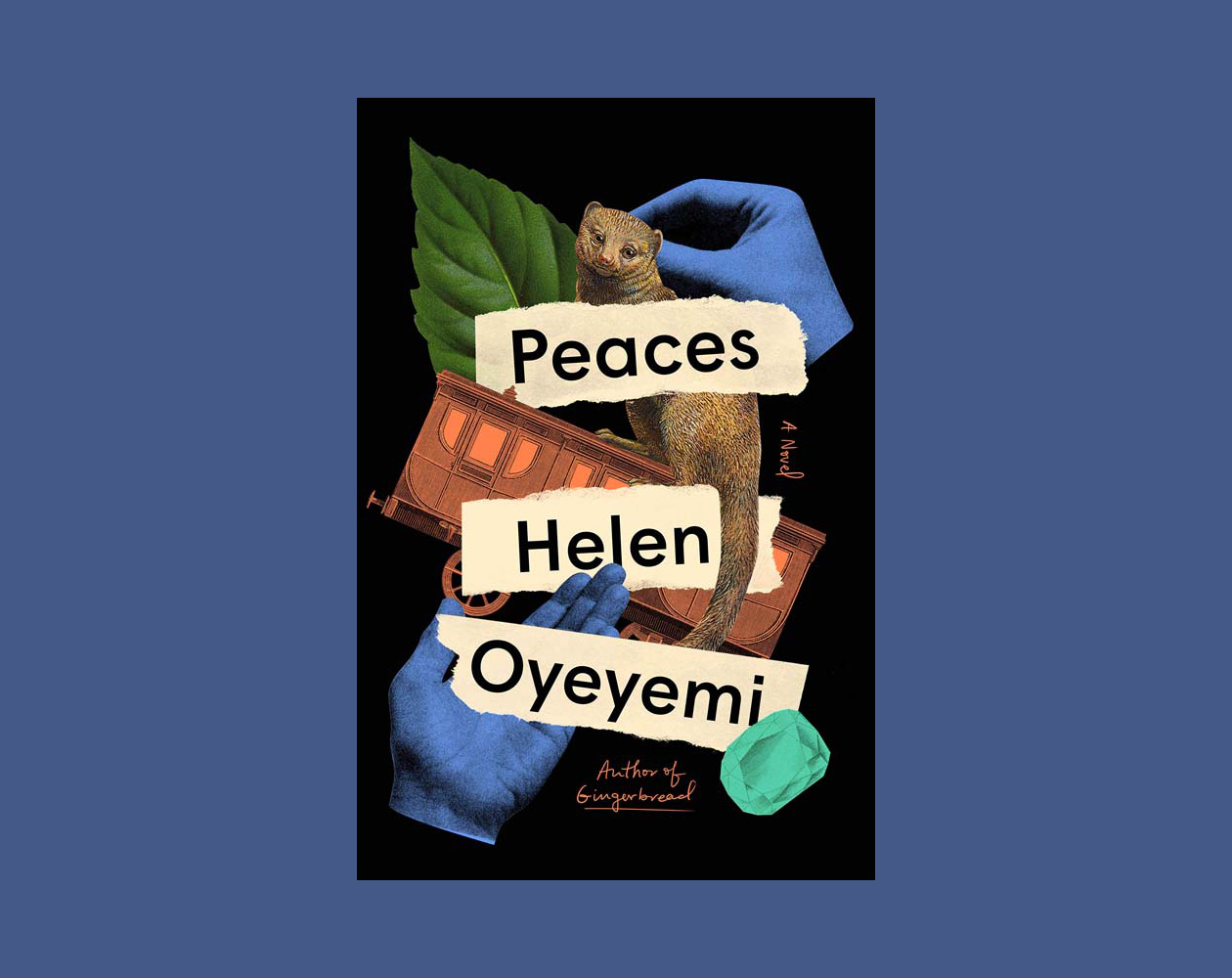Week Nine: Peaces
It's a new month and a new book matchup at Camp ToB 2021! This week, we embark on the mystery train of Helen Oyeyemi's Peaces.

Andrew Womack: Hello, and welcome to the final—HOTTEST—month of Camp ToB 2021! Here's what we're doing: Each week of the summer, we're discussing a novel (selected by you, the readers), at the pace of two books a month. At the end of each month, you vote for one title as your favorite, and at the end of the summer, the community will pick one of the three favorites to advance to a berth in the 2022 Tournament of Books (ToB).
So far, you've chosen No One Is Talking About This as our June winner and—this is news!—Klara and the Sun as our July winner.
(FYI, the five books we read this summer that don't win may still qualify for the 2022 ToB's long or short lists.)
Now let's see what happens with our August matchup!
To kick things off, we're discussing the first half—through chapter eight—of Helen Oyeyemi's Peaces, and after a few chapters of mystery and speculation, it seems like we still have a lot of mystery and speculation to go. Still, to catch everyone up as best as we can: Our protagonist, Otto, and his boyfriend, Xavier, have declared their love for one another, and have embarked on a celebratory voyage on The Lucky Day, a mysterious (see?) train owned by the mysterious (no, really), theremin-playing Ava Kapoor, and at the halfway point we've met a cast of zany characters and have watched our couple's pet mongoose, Árpád Montague XXX, run away with Ava Kapoor's pet mongoose, Chela.
Joining us as Activity Leader this week is Moira Stone. Moira, please introduce yourself to Camp!
Moira Stone: Hi, everybody. I'm an actor and book nerd living in New York City.
Andrew: Ah! Can you tell us more about your work?
Moira: Oh, sure. I'm mainly a theater actor, though I dabble in film and commercials. I specialize in new and experimental plays, and often work with playwrights in developing their work. I love a workshop, which is definitely an effect of my Mom's having dragged me along to her weekly writers group meetings all through my childhood. Sitting in the corner while a table of poets took apart each other's work like mechanics around an engine block was a potent introduction to the murky and fertile ground where an artist's intention and an audience's experience meet.

Andrew: What's your overall feeling about the book at the halfway point?
Moira: I have yet to make my way through a Helen Oyeyemi narrative that hasn't confused the hell out of me. She routinely writes single paragraphs that contain what would be the entire plot of another writer's book: stories within stories, generations-deep family histories, digressions that casually contradict earlier information, etc, etc.
Andrew: I am nodding to the point of making myself dizzy. I don't know if I have any semblance of footing in the book so far. There's so much in here, and given the surreal nature of everything, I'm not sure what's real or not.
Moira: The book has me doubting everything. I pride myself on being a close reader, but I misunderstood at least six facts about the story in the first few chapters alone.
Andrew: I have no idea what's happening. I guess like Otto, I'm just along for the ride at this point? And as for Otto, I've been wondering just how reliable our narrator is?
Moira: Oh totally. I would have gotten that feeling just from the casual way Otto talks—all those ellipses, interjections, "Anyway"s, and ALL CAPS—it always gives me the feeling an author is nestling me deep into a character's subjectivity and then all my antennae go up.
Andrew: I do love the tone, though. I'm hoping Otto is our conduit for not comprehending everything that's happening. There's no obvious story here yet, and it seems like Otto is feeling that too.
Moira: Then again, maybe Otto's slipperiness is a clue that we as readers should loosen up, prepare for a story in which the malleability of identity—of existence, even—is one of the book's main concerns?
Andrew: Yes! About the only thing I'm anywhere near sure about—and I'm not even sure about it—this far in the book is that there's a strong theme of the real versus the imitative. Things like Xavier's story about the version of Venice he saw in Macao versus the real Venice—and how he preferred the fake one over the real thing. And in that same section, about how his parents had him write papers about museums he'd never visited. And of course, the fact that he now works as a ghost writer. Have you been sensing this theme as well?
Moira: Yup! And it's one that I am particularly interested in, given that my job as an actor is to develop an imitation of something—a person, a feeling, a situation—to the extent that it <poof> becomes real. Or, more accurately, "real."
Andrew: Tell me more about this.
Moira: Oh Andrew, I could write a book. I think part of what draws me to Helen Oyeyemi is her easy-breezy way of sailing blithely right past realism. It's confident as hell, for one, but more to the point it aligns with my experience that an exaggerated version of reality is often the truest mirror. When I succeed as an actor, my behavior is always bigger (and weirder!) than normal human behavior, and somehow that appears more true. She knows this, I think—she talks about it in the context of puppets and puppeteers in What Is Not Yours Is Not Yours—and uses that paradox deftly.
Andrew: So when Xavier prefers the fake Venice—
Moira: I think, well, of course. An imitation is always more believable, more legible, than the real thing. It's constructed to be so. (Like the male member of the Parisian couple he's living with at that time says, "You have a better time when you're not expecting anything real.")
Andrew: Hmm!
Peaces by Helen Oyeyemi

When Otto and Xavier Shin declare their love, an aunt gifts them a trip on a sleeper train to mark their new commitment—and to get them out of her house. Setting off with their pet mongoose, Otto and Xavier arrive at their sleepy local train station, but quickly deduce that The Lucky Day is no ordinary locomotive. Their trip on this former tea-smuggling train has been curated beyond their wildest imaginations, complete with mysterious and welcoming touches, like ingredients for their favorite breakfast. They seem to be the only people onboard, until Otto discovers a secretive woman who issues a surprising message. As further clues and questions pile up, and the trip upends everything they thought they knew, Otto and Xavier begin to see connections to their own pasts, connections that now bind them together.
Book description excerpted from publisher's summary and edited for length.
Moira: Another theme I'm picking up on is—and I'm not sure I have a firm grasp on this yet—something about how refusing to see someone clearly is a kind of intimate violence. Or maybe that's too strong a term? It's definitely a rejection, though. And like Otto says on page one, some emotive types will rally under the banner of FOREVER REJECTING YOUR REJECTION. The question is, what form will that counter-rejection take?
Andrew: I wonder. If it isn't clear to everyone yet, there's a lot of wondering at this point in the book.
You know, looking back at page one to that quote you mention, I'm re-noticing something I'd forgotten about, but which I thought was odd at the time—among so many things—which are the first couple of lines of the book:
Have you ever had an almost offensively easy breakup? The kind where the person you've just broken ties with because of blah blah and blah gives you a slight shrug, a "Thanks for everything-especially your honesty," then walks away whistling Hoagy Carmichael's "I Get Along Without You Very Well"?
Moira: Great American Songbook fan that I am, I'll add that "I Get Along Without You Very Well" goes on like this:
Of course I do
Except perhaps in Spring
But I should never think of Spring,
For that would surely break my heart in two
So that complicates the message a fair bit!
Andrew: I think this book may be toying with me.
But! About the whistling: And then near the halfway mark of the book, we get someone whistling the Beach Boys' "Don't Worry Baby." My initial theory here is that this is the author telling us, Don't worry, I have a plan for how this whole thing is going to wrap up.
Maybe this song holds clues as well? So, what is it trying to tell us? The novel is clear that the person is only whistling the chorus, which is, naturally, just "don't worry, baby" over and over.
I'm not sure I'd be able to identify that chorus being whistled, especially with all those harmonies, but OK.
Moira: Right? Makes it a weird choice to whistle, with just that lone melodic line out there on its own. (Semi-related personal opinion: Beach Boys songs are the most satisfying to sing in the shower. All that reverb.)
Andrew: Hahha. And seriously, the reverb on this one:
Anyway, why all the whistling?
Moira: Well, we've got the easy rhyme with the noise a train makes. And of course, good whistling—that is to say, a rich, full tone with varied dynamics and vibrato—has a lot in common with a well-played theremin, no?
Andrew: It's an answer, and I'm dying for them at this point in the book!
I'm not betting on anything, but I felt like the well-told history of Árpád Montague XXX hinted at some kind of story that matters in the overall plot. I want to know who placed those vipers in the room.
Moira: Maybe! But also: why on earth do you feel that's a thread that's gonna be explained?
Andrew: I'm grasping!
Moira: Why not the mystery of who Yuri is, or where exactly the train is going, or who's the mysterious ex who gave Otto the day-of-the-week boxers?
Andrew: All those too! About all we know for sure about Yuri is that he's Xavier's ex. You're right. He's probably more interesting than a mongoose. But hey, all bets are off with this book, I think!
So yes, I think for me the reason the story about Árpád jumped out was because of the way it was told. I felt like a seed was being planted. I'm probably wrong for even trying to out-guess this book, though, aren't I? Want to join me in some speculation?
Moira: I'm on record as getting a lot wrong already, so sure. I hereby recklessly state that I think Ava Kapoor is being held hostage on this train (which is real, though traveling through a landscape that is only a metaphor for England), and that Chela the mongoose will turn out to be a heroine for the ages.
Andrew: I'm ready for it! I want answers!
Moira: Oh god yes. Answers are all I ever want.
Andrew: I think we're in the same boat here. Or maybe train?
Here at the halfway point, this would absolutely be a DNF for me—except for the fact that this is Camp ToB, and I have to finish the book or you're all going to force me to go sleep on the beach or something. No, I'm going to finish it, but so far this has been a wholly unsatisfying read. There are so many hints of so many things, but because we've had no payoff in the plot(s?) as yet, and because the book has put us squarely in a position of assuming we can't assume or know anything about this world, I'm not really feeling like it's ever going to come together like I want/need.
So you and I have lots of questions. Not a lot of answers. Do you have any remaining questions about what is even happening in this book?
Moira: Many, but I'll pick one: will Otto's day job as a hypnotist be the key to unlocking the mystery of Přem Stojaspal?
Andrew: Let me state with 100 percent certainty: Who knows.
OK, that's it for us! Thank you, Moira!
Commentariat, what are your questions—or do you have any answers? Let us know, and I'll be back next week to talk about what even happened in the conclusion of Peaces.
The Camp ToB 2021 Calendar
- June 2: No One Is Talking About This through part one
- June 9: No One Is Talking About This to the end
- June 16: Detransition, Baby through chapter four
- June 23: Detransition, Baby to the end
- June 30: Klara and the Sun through part three
- July 7: VACATION
- July 14: Klara and the Sun to the end
- July 21: Whereabouts through "At the Cash Register"
- July 28: Whereabouts to the end
- Aug. 4: Peaces through chapter eight
- Aug. 11: Peaces to the end
- Aug. 18: Everyone Knows Your Mother Is a Witch through page 137
- Aug. 25: Everyone Knows Your Mother Is a Witch to the end
- Sept. 1: Announce summer champion
You can find all our summer titles at our Camp ToB 2021 Bookshop list.
